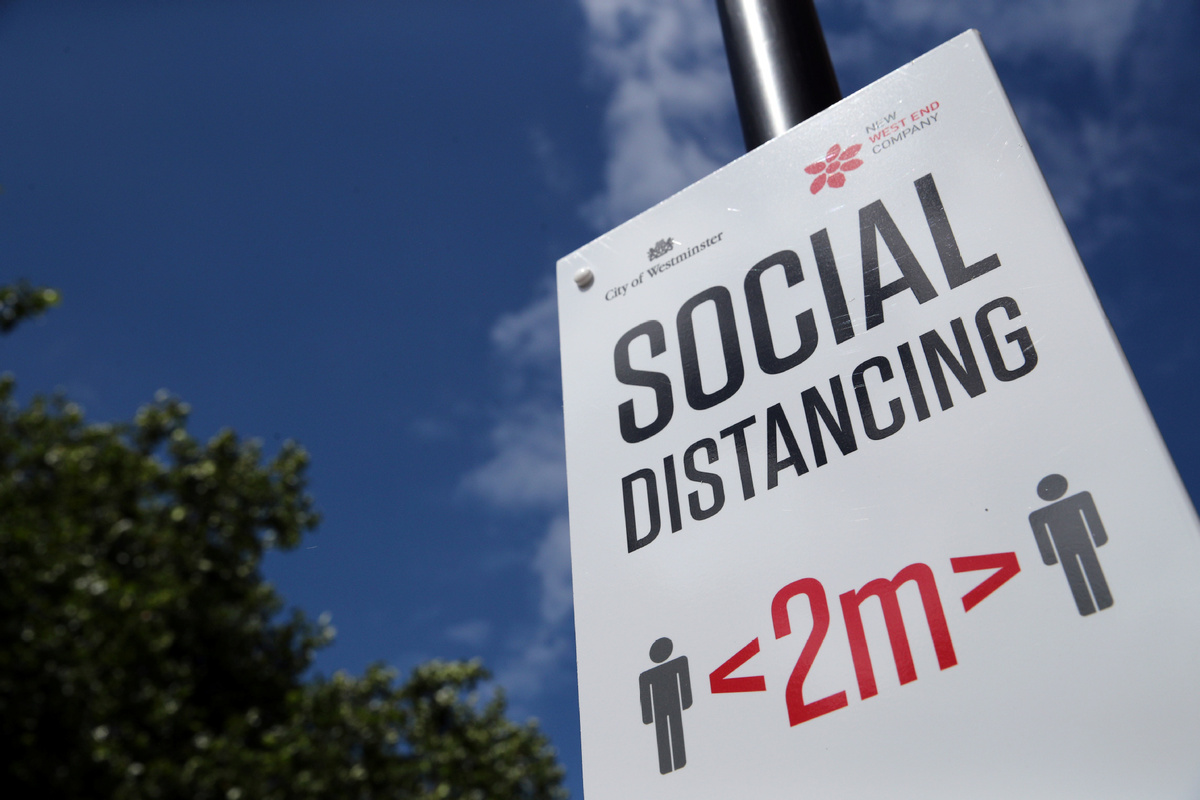Two meters seen as a business killer


British government under pressure to modify social-distance spacing rules
The British government is being urged to abandon its requirement for people to have a 2-meter buffer around them when not at home, a rule critics says is excessive and economically damaging.
The 2-meter zone is among the country's social distancing measures aimed at stopping the spread of COVID-19, which in Britain has infected more than 295,000 people and claimed nearly 42,000 lives.
Business groups in the country said the rule is financially untenable for pubs and restaurants. They are calling for a 1-meter zone, something the World Health Organization deems adequate.
Several members of Parliament from Prime Minister Boris Johnson's ruling Conservative Party support the change, including former cabinet ministers Iain Duncan Smith and Damian Green.
Duncan Smith, who was once party leader, told the Daily Mail newspaper: "The number one and single most important priority to unlock the economy is getting the distance down to 1 meter; the hospitality sector simply can't make a living at 2 meters."
Countries that have a 1-meter distancing zone include Denmark, France and Singapore.
The change would make "a huge difference to many parts of industry", Green told the BBC.
However, Johnson has said he will take his lead from Britain's scientific advisers, who favor a 2-meter zone.
"My judgment, at present, is that we must proceed cautiously," Johnson said earlier.
European Union officials and experts warned on Thursday that Europe could face a resurgence in COVID-19 infections in the coming weeks caused by mass protests in the continent as well as countries gradually loosening their control measures.
On Saturday Italy's Prime Minister Giuseppe Conte began a nine-day set of high-level talks aimed at relaunching the country's economy after weeks of coronavirus quarantine.
"We shared our strategic objectives (with participants): modernization of the country, a transition toward environmental sustainability, and social inclusion," Conte told reporters after the day's work was concluded.
This week, Conte said, the government will consult Italian civil society, such as trade unions and the industrial, cultural and business sectors, to continue debating his government's recovery plan.
"We will make sure we won't waste a single euro. We want to improve our country and our performance, which to us means not only economic growth but also sustainable development."
Bold measures
Meanwhile, also addressing those in attendance on Saturday was Ursula von der Leyen, president of the European Commission, who expressed optimism over the health of the Italian economy.
"Your government has taken bold measures, asking people to stay home for long weeks and months," she said. "It required courage, but it worked. And you led the way for other (European Union) member states. You have also taken bold measures to secure jobs, protect companies and limit the damage to the Italian economy. And after the deep fall in the past months, economic activity is gradually rebounding.
"The recovery will be a generational challenge, not only for Italy but for Europe as a whole."
No country can go it alone, she said, "so solidarity is not only the most ethical choice but also the most effective way to deal with a crisis of this magnitude".
Italy recorded 346 new cases of infection from the novel coronavirus in a 24-hour period, but total active infections fell to 27,485, compared with 28,997 a day earlier, officials said on Saturday.
This came 10 days after the last remaining restrictions under a nationwide lockdown were lifted and Italians were again free to travel within their own country, beginning on June 3. It also came one day after the number of total active cases fell below 30,000 for the first time since March.
Russia reported 8,835 new cases of the novel coronavirus on Sunday, taking the number of infections nationwide to 528,964.
Separately, work market in France has been estimated to have cost 500,000 jobs.
In Germany, Lufthansa said it will lose 22,000 jobs as the airline restructures following a 9-billion-euro ($10 billion) state bailout.
Xinhua and agencies contributed to this story.

































